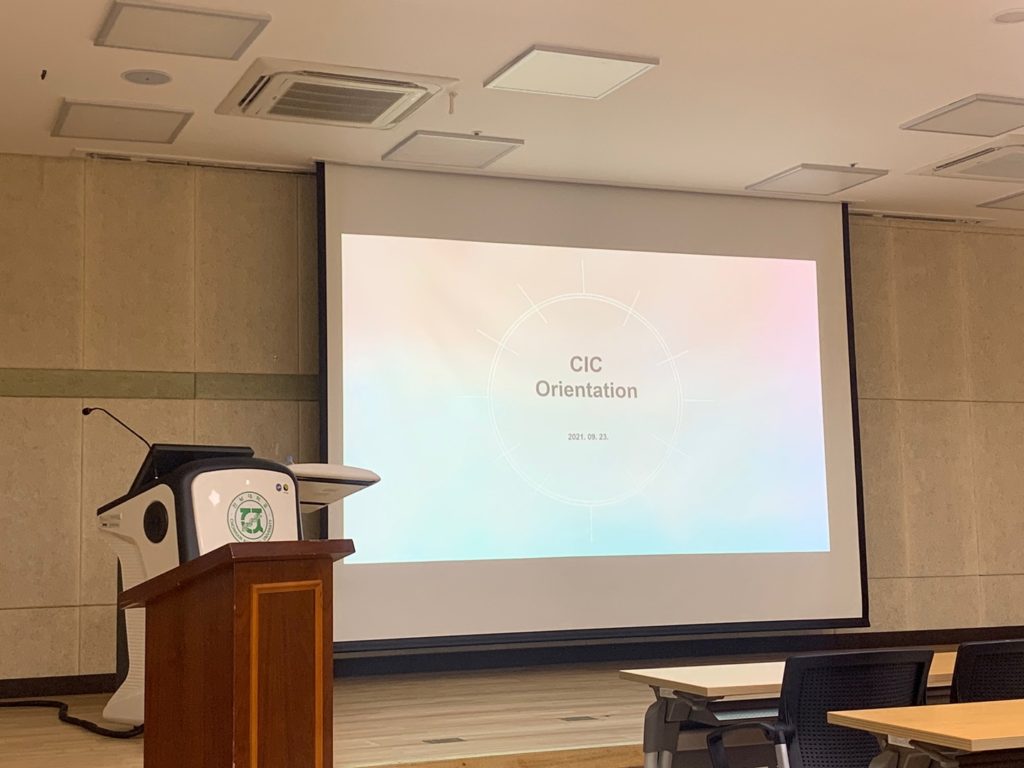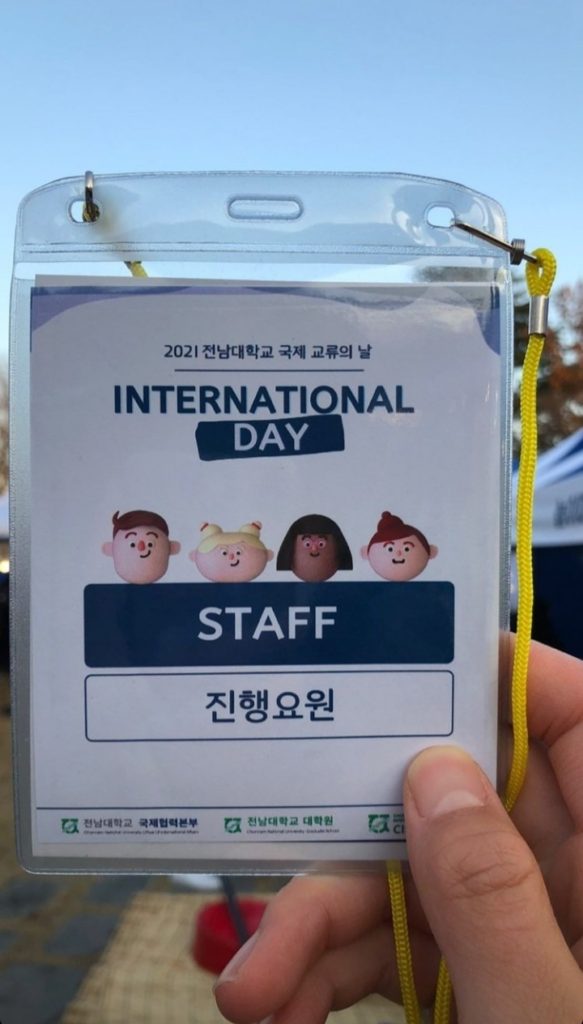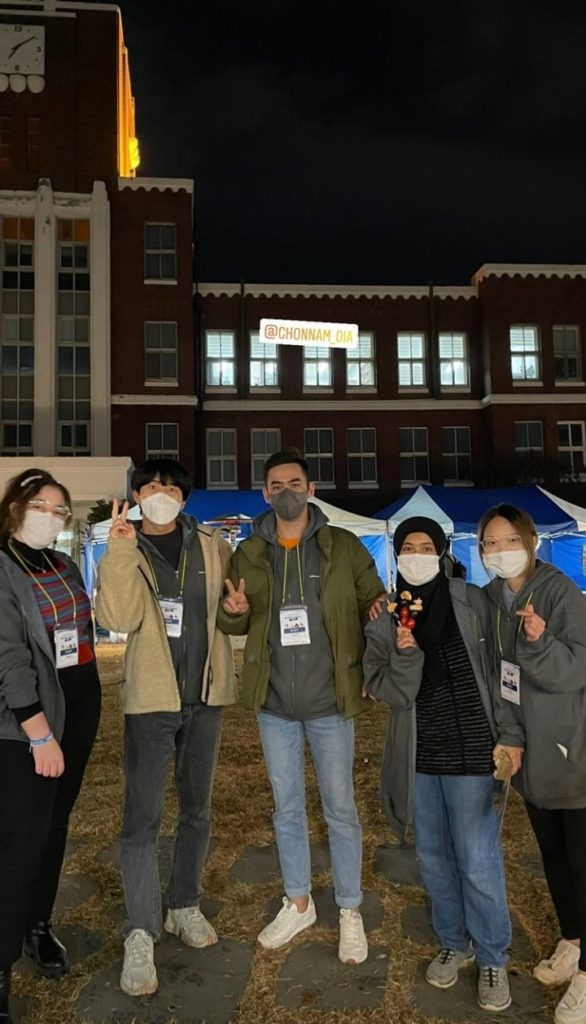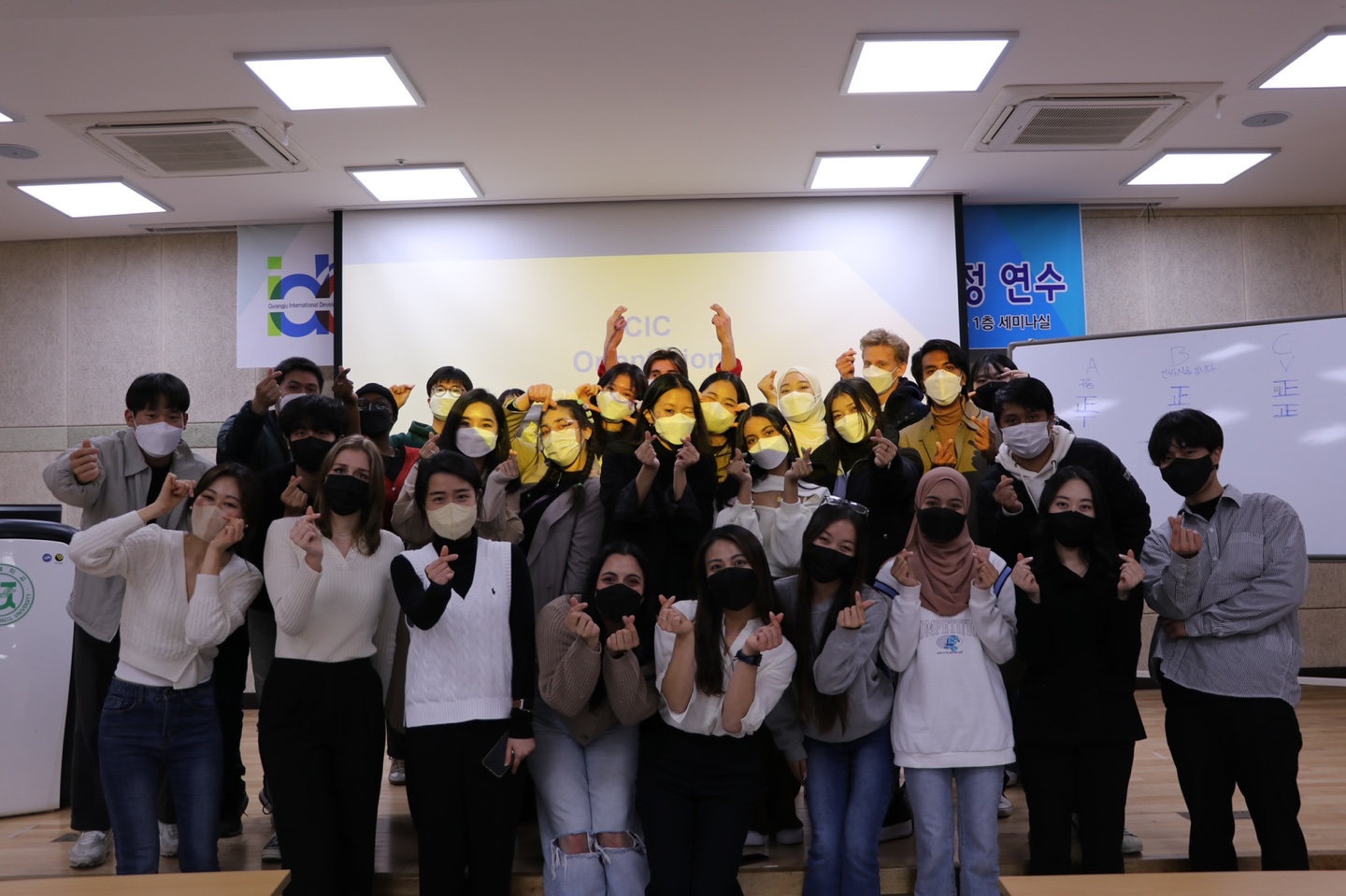Joining the Chonnam National University International Community: A Better Way to Connect Students of All Backgrounds
Simply packing your bags and moving abroad to study is no guarantee that you will connect with your new home away from home. To get the most out of the study abroad experience, an attempt at integration is often vital. The following interview explores a few of the excellent campus groups at Chonnam National University (CNU) that serve to link incoming foreign students with locals for deeper cross-cultural exchanges.
Yousra Feriel Drioua: Thank you for taking the time to do this interview. First of all, could you introduce yourself to Gwangju News readers?
Azamjanov Anashkon: Hello there. My real name is Azamjanov Anashkon, but you can call me Aaron. I am 25 years old and currently in my last semester as an electronics and computer engineering major.
Yousra Feriel Drioua: How long has it been since your first arrival in Korea and why did you choose Korea and not a different country?
Azamjanov Anashkon: I first arrived in Korea in August 2017. There are two ways in which that question can be answered, really. The more natural one is that Korea’s IT field is highly developed, and I am passionate about IT. Therefore, for my future, I chose to come here. The second and more honest one would be that I did not know much about the world after graduating high school, just like any other young person that age. Chonnam National University offered a lot of scholarships to my country; my seniors recommended it, and I happened to meet the criteria for the scholarship, so here I am today.

Yousra Feriel Drioua: What exactly is the CIC club and what is your involvement with it?
Azamjanov Anashkon: There are in fact two similar-sounding campus groups that I have been a part of. One is called Chonnam National University International Supporters (CIS), where I was on the content creation team, and the other is known as Chonnam National University International Community (CIC), where I am the vice president.
CIS is an entity made of seven students, both Korean and international students, with the common goal of supporting international students in getting accustomed to campus life. The aim has been to make the campus experience more enjoyable by helping students from abroad create long-lasting memories during their time at CNU. This is done through hosting various events like contests and by sharing valuable information about other programs.
CIC, on the other hand, is a club that strives for cultural exchange in a highly globalization era. There are three divisions within it: language exchange, cultural exchange, and volunteer work. Each month, the club members can choose a division and create their activity plans within their respective groups of four members each.

Yousra Feriel Drioua: Knowing there are many other foreigner-friendly clubs at CNU, why did you choose both CIC and CIS? Also, how did you join each?
Azamjanov Anashkon: I used to be a member of my department’s club, which was also an exciting and fun experience. However, CIC provided the most comfortable space for foreigners, in my opinion. It truly is a club that will offer you cultural exchange through direct interaction with people. You make friends, learn new notions, and create lasting memories. Also, to join CIC, you are not required to have a good level of Korean, whereas in other clubs, that might be a necessity for foreigners.
As for my CIS application process, I was rejected the first time due to my inadequate English. The second time, I took someone’s place because they dropped out. And the third time, there was no interview needed as I voluntarily stayed. I kept trying to join CIS because I genuinely enjoyed my time there, but also because CIS needed a foreigner’s perspective, so they were welcoming of international applications.
Yousra Feriel Drioua: How has your relationship with the other CIC and CIS members been since you are the only foreigner?
Azamjanov Anashkon: For CIC, I was not the only foreigner – not at all. As the club aims for cultural exchange, there was not a single dull moment. It was all fun without any complications, and I got to meet amazing people and have a wonderful time.

For CIS, it was as good as it could get. There was mutual respect, work ethic, and fun times as well. But looking at it from a different perspective, there is this notion called ui-sa so-tong (의사소통, communication). No matter how good it was during the start, as time went by, it felt like the other members were getting closer, but I was not. It was not intentional or due to bad feelings. It naturally happened simply because of certain cultural differences and things that I was oblivious to as a foreigner.
Yousra Feriel Drioua: What have been some of your biggest challenges and lessons learned with CIC?
Azamjanov Anashkon: I believe the biggest challenge was working in a team with different minds and perspectives. However, that provided room for many lessons that I am sure I will take with me in the future in any field. One lesson learned is that teamwork is key. Not only did this teach me to take a step back instead of forcing my opinion on others but also not to run alone. Because we are a team, I should not be a heavyweight dragging the team backward, nor should I run too far ahead by myself. I learned how to be in the middle and work with my teammates. Another valuable lesson I learned is that if I like the people I am working with, I can work sincerely while enjoying it.
Yousra Feriel Drioua: Within your content-creation position at CIS, have you been able to deliver your vision, ideas, and opinions openly and freely?
Azamjanov Anashkon: Unfortunately, not everything I suggested was approved. I definitely had the space to express my thoughts and ideas freely. What encouraged me was the fact that people recognized my work. I was part of the content creation team, which had a lot to do with creativity. So, people being able to distinguish my work from that of others was very gratifying.

Yousra Feriel Drioua: How has becoming a CIS member helped you with adapting to Korean society?
Azamjanov Anashkon: Again, the key lesson for me was teamwork. But when it comes to the Korean mindset, I understood how certain things functioned within the workspace here. When it comes to delivering feedback, something about the work culture here is that you can be as honest as you please, but you must express it delicately. For example, instead of saying, “this design is too boring, you should change the colors, use that font, etc.,” You should opt for “I think the design would look more eye-catching if we make some small alterations. How about you try to use this color instead? I think this font would also look nice.” This approach not only ensures that you do not offend or hurt your colleague’s feelings, but it gets the job done!
Yousra Feriel Drioua: What is your dearest memory with either group?
Azamjanov Anashkon: My favorite memory was, without a doubt, the CNU International Day Festival. We worked extremely hard to prepare for it and were really tired, but it was worth every effort. The sight of everyone enjoying themselves is something that I will cherish forever.
My second favorite memory was the Seollal celebration. Someone told me that day, “Because of Covid, we couldn’t go back home. But this event you prepared made us feel less alone since we don’t have any family here.” Those words brought warmth to my heart and made me think everything we do in this little space is worthwhile.

Yousra Feriel Drioua: Do you think it is important for foreign students in Korea to consider joining university clubs? If so, please tell us why.
Azamjanov Anashkon: I do not think it is a necessity per se if you do not want to. But I believe it has a lot to offer you. You learn certain aspects about Korea’s work ethics, office culture, and other notions. And you will also sharpen your “soft” skills, gain more insight and, if you are in luck, make life-long friends. It is the main difference between truly soaking in the campus life as a local vs. a foreigner.
Yousra Feriel Drioua: Any tips for new or incoming foreign students?
Azamjanov Anashkon: First, learn Korean. Yes, you might be able to survive with English in some areas, but for your peace of mind and overall experience, you should invest some time in learning the language. How can you learn Korean, you might ask? Through making Korean friends! It is the most natural way to do so. Now, how do you meet those friends? Either attend classes together or join a club! Either way, it is a confirmed learning method!
Second, you must create a comfort zone for yourself, not just in Korea, but anywhere far from home. A comfort zone could be familiar places, faces, and reliable friends.
Yousra Feriel Drioua: Now that a new semester has started, what would you like to say to your successors?
Azamjanov Anashkon: My number one tip is to communicate to get along, enjoy your experience, and strengthen your friendships. You must talk, make efforts to understand each other, reach out to one another, and not be afraid to ask for help from one another. At the end of the day, you are a team.
Yousra Feriel Drioua: Is there something you would like to say to Gwangju News readers to finish things off?
Azamjanov Anashkon: Thank you for this opportunity. And I will be sure to cheer you on in your endeavors!
The Interviewer
Yousra Feriel Drioua is an Algerian citizen and a new expat. She has left behind a major which took five years to complete in order to seek a new adventure as a 2022 GKS Scholar in Korea. She enjoys discussing various topics, learning new things, and gaining different experiences with the ultimate goal of having no regrets. Instagram: @myyilgi







